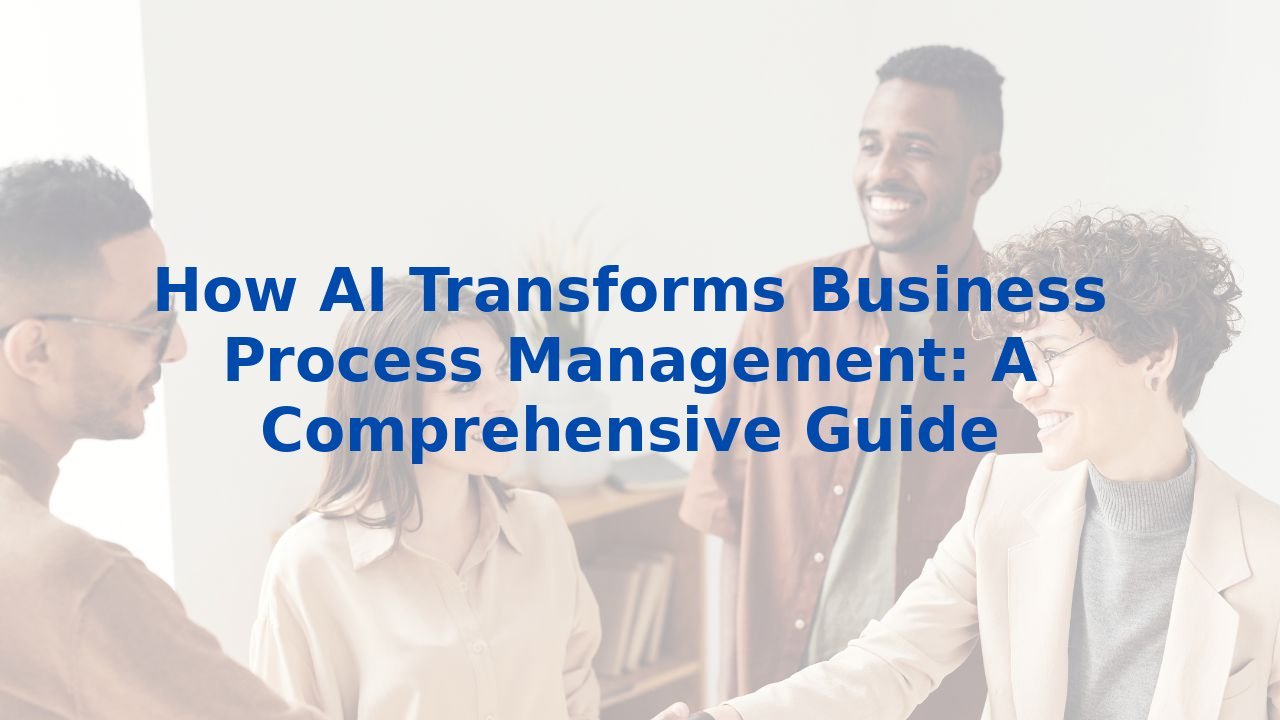How AI Transforms Business Process Management: A Comprehensive Guide
How AI Transforms Business Process Management: A Comprehensive Guide
In a world where efficiency is king, organizations constantly seek innovative ways to optimize their operations. Enter Business Process Management (BPM)—a systematic approach aimed at making business processes as efficient and effective as possible. Now, imagine amplifying BPM through Artificial Intelligence (AI). This transformative force is reshaping not just how we conduct business, but how we understand and interact with our operations. In this guide, we will explore the pivotal role of AI in enhancing BPM, detailing process discovery, mapping, automation, management, and improvement.
1. Process Discovery: Unveiling Hidden Efficiencies
Every organization has a plethora of processes operating beneath the surface. AI-driven process discovery acts as a magnifying glass, revealing hidden inefficiencies that traditional methods often overlook. By utilizing tools like process mining and natural language processing, AI identifies patterns and bottlenecks buried deep within existing processes. This thorough analysis helps organizations pinpoint redundancies and inefficiencies, which are crucial for refining operational models.
Where conventional methods rely on interviews and manual data analysis, AI can swiftly sift through vast datasets, offering a comprehensive view of your operations. Imagine the power in understanding your workflows at a granular level; this knowledge propels you toward financial and operational successes previously thought unattainable.
2. Process Mapping: Creating a Blueprint for Success
Once the discovery phase uncovers hidden truths, the next step is process mapping. This phase translates insights into visual blueprints that delineate workflows and interconnections. AI’s ability to analyze data through machine learning allows for creating dynamic process maps that adapt over time.
These AI-generated maps not only improve documentation accuracy but also serve as customizable frameworks tailored to an organization’s unique needs. This adaptability is essential for businesses striving to maintain relevance in a fast-paced, ever-changing landscape.
3. Process Automation: Streamlining Operations
Automation represents one of the most significant advancements within BPM, thanks to AI. Organizations can reduce human involvement in repetitive tasks by deploying AI bots for activities like data entry, invoice processing, and more complex functions. Think about it: by freeing up human resources, companies can channel creativity and strategic thinking into areas that truly require a human touch.
This kind of efficiency not only bolsters productivity but also reduces the likelihood of human error. As processes become increasingly streamlined, organizations can maintain focus on their core objectives and take on challenges that drive real business growth.
4. Process Management: Continuous Monitoring and Improvement
AI's influence extends far beyond mapping and automation; it enhances daily process management as well. With the help of AI-powered monitoring tools, businesses can keep a continuous pulse on key performance indicators (KPIs). By evaluating historical data patterns, AI can alert management to potential issues before they escalate, allowing for prompt corrective action.
This proactive approach to problem-solving ensures that processes remain aligned with organizational objectives while fostering a culture of continuous improvement. It’s about harnessing data not just as feedback, but as a compass guiding strategic initiatives.
5. Process Improvement: Data-Driven Insights
Last but certainly not least, AI empowers businesses with data-driven insights that catalyze continuous improvement. Through predictive modeling and root cause analysis, AI enables organizations to refine processes on a dynamic basis. The capability to analyze large datasets allows AI to reveal trends, predict future behaviors, and identify inefficiencies in real-time.
This transformation shifts the decision-making paradigm from intuition-based to insight-driven. It provides a strong foundation for organizations to adapt swiftly and competitively in their respective industries.
The Benefits of AI in BPM
The integration of AI into BPM is not just a nice-to-have; it’s a necessary evolution. Here’s a glance at the multifaceted benefits:
- Improved Efficiency: By automating mundane tasks, AI liberates human potential for more impactful contributions.
- Enhanced Decision-Making: Data-driven insights cultivate better strategies and informed tactical decisions.
- Real-Time Monitoring: Immediate visibility into processes allows organizations to make swift adjustments and minimize disruption.
- Optimized Resource Allocation: With data analysis, AI aids in maximizing resource efficiency, including labor and inventory management.
- Risk Mitigation: By flagging deviations early, AI helps organizations proactively manage risk.
The Importance of Employee Training for AI
Yet, the transformation does not stop at technology; it extends to your workforce. Training employees in AI is pivotal. Educated employees are equipped to understand, analyze, and operate AI tools effectively, ensuring these technologies are leveraged to their fullest potential. The training enables teams to identify areas ripe for improvement, fostering a culture of innovation and growth.
When employees are empowered with AI knowledge, they transition from passive participants to active contributors in your organizational journey. Investing in AI empowerment is not just an enhancement of skills; it's a deliberate strategy to drive success.
In conclusion, AI’s integration into Business Process Management is not a mere trend—it's a transformation. From discovery and mapping through automation and continuous improvement, AI helps organizations achieve unprecedented efficiencies and productivity. Most importantly, empowering your workforce through education ensures that all these advancements are not just beneficial but sustainable, paving the way for a future where potential is limitless.



